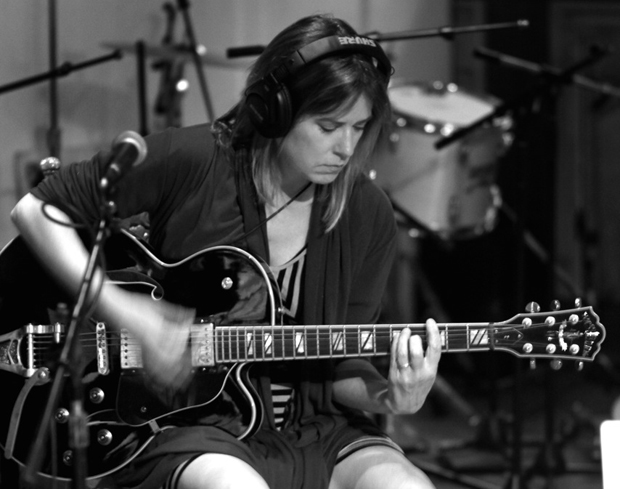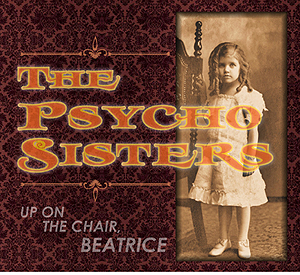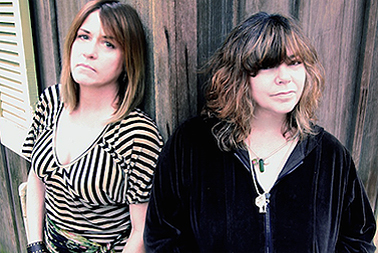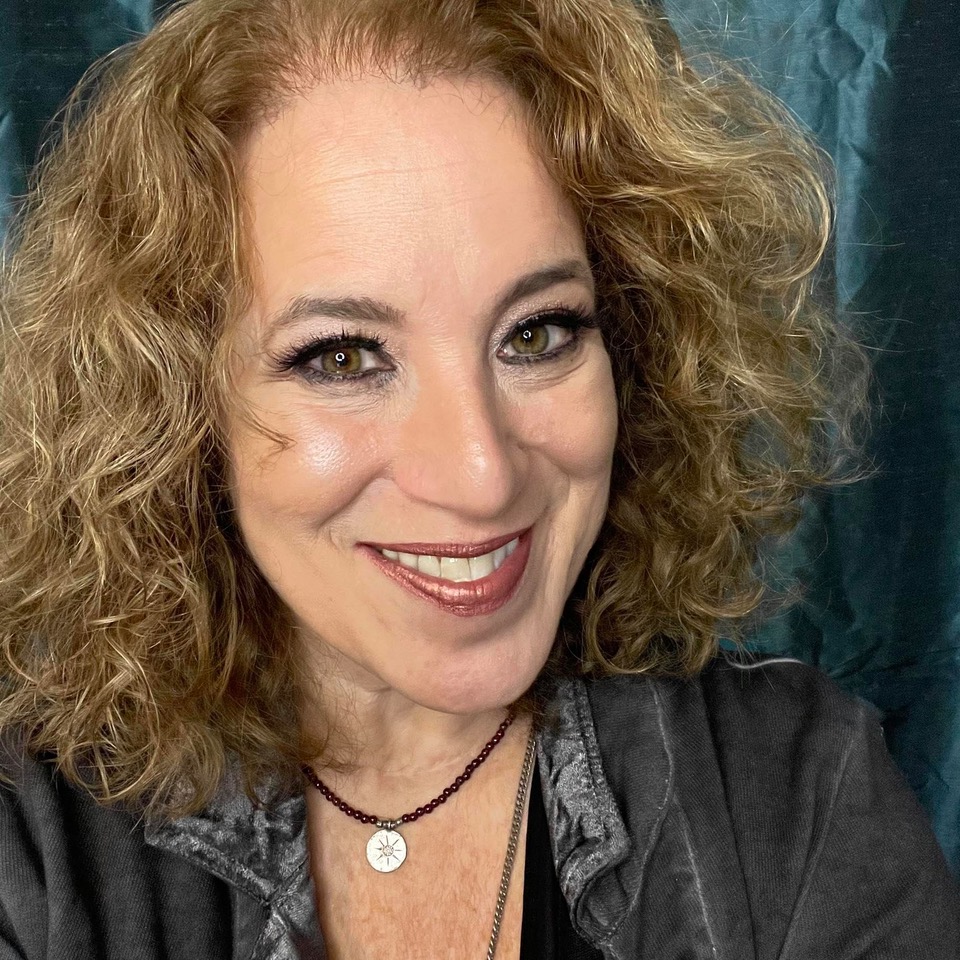Vicki Peterson Goes Psycho — Exclusive Interview

She’s a guitarist. A Bangle. AND so much more.
Vicki Peterson doesn’t just know how to walk like an Egyptian. She’s got a few seriously awesome tricks up her masterful sleeve.
One of those is her side-project, the Psycho Sisters. A labor of love for Peterson and her sister-in-law Susan Cowsill, the Psycho Sisters’ new album, Up On the Chair, Beatrice released on August 5, but it was 22 years in the making.
Cowsill, who’d won America’s heart as a little girl singing in the ’60s family band The Cowsills, teamed up with friend and Bangles’ guitarist Peterson in 1989.
In the early ’90s, as the Psycho Sisters, they toured Europe and the U.S. with Giant Sand and Steve Wynn. In demand as celebrity background singers (Jules Shear, Belinda Carlisle, Hootie and the Blowfish), the Sisters were not focused on their own recording career.
For a decade, the two were members of the all-star Americana ensemble the Continental Drifters, which included the Dream Syndicate’s Mark Walton, guitar wizard Robert Mache, the dB’s’ Peter Holsapple and New Orleans drummer Russ Broussard (Cowsill’s husband).
Somewhere in their busy schedules of other projects and life in general, the stars finally aligned to allow them the time to record this set of quirky, lovely, slightly twisted songs. The material was written years ago but never made it to the studio until now.
Get The Pick Newsletter
All the latest guitar news, interviews, lessons, reviews, deals and more, direct to your inbox!
We spent a few minutes with Vicki Peterson recently to talk Psycho and get the inside scoop.I really like Up On The Chair, Beatrice. Very quirky!

Yes, quirky. It is a little weird.
thought it was interesting because the subject matter of not all but some of the songs, it’s almost like it’s meant to bug somebody. It’s not all roses and rainbows. Tell me a little bit about what you were experiencing at the time that you worked on this music.
The songs themselves date back to when Susan and I first started writing together. And this was in the very early ‘90s, literally ’91-’92. And therefore, we were young women experiencing the blows and ebb and flow of relationships and spectacularly, dramatically, horrible relationships can make for really good songs.
And we’ve had our share. We were writing about what we were experiencing and/or what we were observing in other people’s lives. It was a sort of rich moment in time and we always promised ourselves that we would one day make a record called Up on the Chair Beatrice.
And then things came, things went. Susan and I both moved to New Orleans. The Psycho Sisters were kind of absorbed like a science project into the Continental Drifters. That occupied our time and creative outlet for about ten years.
And then I moved back to LA, married her brother, working with The Bangles again. Susan started a very successful solo career. Days come, days go, blah blah blah, and one day we kind of said, “Hey, what are you doing the next six months?” There was actually a little window of time where we thought we might be able to actually make this record. And that window did open.
We went on Kickstarter and raised a few thousand dollars to get our musicians paid and our engineer paid and made this record in a wonderful studio in Louisiana, that’s kind of our home-base studio.
So as you were working on these songs from however many years ago, did you change them at all? Did you update them or were there things that you said, “No, that doesn’t work anymore”?
Nope. We did not. We were actually working from memory, muscle memory, and cassette tapes, because we didn’t have any of this stuff properly documented in any way. Not even rehearsal tapes, just writing tapes.
But we remembered everything, it just came back. We felt like we needed to honor the songs. For two songs, I think we changed the key. We actually raised them. But as far as the actual composition, we did not make any changes. As far as the lyrics, we let them say what they said. It was a record of that time and those feelings and that relationship. That’s interesting! I write myself and sometimes there’s just that one word that you always hated, that you said, “One day I’m going to change that.”

I didn’t come across anything that felt false. We were sort of joking that women in our 50s talking about our… Well, for instance, the song “Heather Says,” which we didn’t write. It was by Judi Pulver and Waddy Wachtel. And that was recorded by The Cowsills in 1971.
So we’re singing about being in the fourth grade. But you know what? Bullying is timeless and ageless, in certain ways. I think everyone gets it. When we play live, that’s definitely a favorite.
That’s a brilliant song. Did you purposely open the album with that song because it is so disturbing, to kind of set the stage?
Haha, I pretty much wanted to give people an idea what was to come.
When you were recording, did you do the guitar work on the album?
Yes, minus I think Susan played acoustic on a couple of tracks. But yeah, I did all the acoustic and electric guitars, both in Louisiana, then added some electric guitar, some 12-string here at my home studio.
Can you give me an idea of what guitars you use?
Yeah, a lot of the rhythm tracks were tracked with this very cool Washburn hollowboady that Susan’s brother Barry gave her. It’s really an excellent guitar and it has a distinctive sound.
Besides that, I believe I’ve got my ’67 Strat on this record as well. And also, from a friend I borrowed a 12-string Taylor acoustic..
You always need a friend like that.
He’s got a closetful. I’m like, “Can I have the banjo?” He’s quite valuable that way.
I also used a vintage Rickenbacker 12-string, borrowed from Steve Nails (the proprietor of Dockside Studios), and my own Roy Buchanan 12-strong. Yup—lots of 12 strings on this record!
And then I also played my Daisy Rock guitar on this album. It’s The Bangles edition Daisy Rock guitar. It records really well and again, it’s a versatile guitar. It can do the jangle thing but you can also touch it up and sound really distorted and rock.
you have other musicians join you guys in recording?
Oh yeah. We had a great assemblage. We had two drummers. It happened to be the drummers we’re married to.
That was probably one of the most interesting and possibly difficult decisions we had to make. To figure out which drummer would play on which song, and how to tell them.
We sort of intentionally gave them songs that were not natural to their instinctive abilities. Like Russ is good at sort of complex polyrhythms and percussive drumming. John is a perfect pop Ringo drummer. So we made John play on a couple of things that were a little complex. He played on “Heather Says,” because he recorded that one when he was 16. But it really was a fun part of the project for me.
They were great. There was actually one song, I believe it’s the Peter Holsapple composition, “What Do You Want From Me?” where they both play on that song so we swapped them out. John played the chorus and…
Oh, that’s funny.
And then we have a keyboard player named Janson Lohmeyer. He played with Susan for many years in New Orleans. He played piano, organ and accordion. And then we have these kind of insanely talented brothers – Jack and Sam Craft. They played violin and cello. All the strings that you hear are from the Craft brothers. They’re just freakishly talented musicians.
We’d give them a chord sheet, basically. We’d give them a sense of what we wanted, sing them one melody, mainly for this part. And they would sort of put their heads together for about 3.5 minutes and go, “Okay!” They add a lot of that quirky, vaudeville flavor to the record with our pushing them, “No, that’s not too weird. Do that.” They added a lot of the flavor to the record.
So, you did a Kickstarter for this. Was there anything that surprised you with that part of the project?
Well, yeah. We asked for $7,000 and we got $13,000. That was a surprise. We were afraid to ask for too much money. We were being very modest in our needs, considering this is an actual running professional studio. And those are expensive. So, of course, we ended up spending money, too, but it was a labor of love.
The other surprising thing was how much work it was to do. And how much when you’re sitting around thinking, “It would be really fun to… We’ll promise them this. Give them that. It’ll be great.” And then I spent the new two years trying to fill the rewards.
To be honest, there are still some things that haven’t been fulfilled for various reasons. So, I was literally an hour ago thinking about that, “Wow, how can we get that last thing we promised? And make that Skype call? We’re going to have to be in the same room. We’re still working on it, to be honest.
Do you have any plans going forward to write some new material, perhaps?
We do. We’ve been discussing it on and off. Susan’s doing some Cowsill things at the end of this summer and into the fall and I’ve been doing some Bangle touring, so we’ve been a little occupied.
But we’re going to be doing some shows in the winter and possibly touring Europe in the spring, we’re working on that. Then we’ll probably start working on some new material. We’ve already come up with a couple of ideas. In our psycho way, it’s just conversations. It’s like, “That a song!”
Haha, take note!
This time, instead of having to run a cassette player, I just talk into my phone. It’s a little easier.
Keep up with the Psycho Sisters at https://www.facebook.com/pages/Psycho-Sisters-Social-Club/
Top photo of Vicki playing her guitar by Dennis Gardner.
Laura B. Whitmore is a music industry marketing veteran, music journalist and editor, writing for Parade.com, Guitar World, and others. She has interviewed hundreds of musicians and hosts the She Rocks Podcast. As the founder of the Women’s International Music Network, she advocates for women in the music industry and produces the annual She Rocks Awards. She is the Senior Vice President of Marketing for Positive Grid, making the world safe for guitar exploration everywhere! A guitarist and singer/songwriter, Laura is currently co-writing an album of pop songs that empower and energize girls.
“The rest of the world didn't know that the world's greatest guitarist was playing a weekend gig at this place in Chelmsford”: The Aristocrats' Bryan Beller recalls the moment he met Guthrie Govan and formed a new kind of supergroup
Carlos Santana hospitalized following pre-show medical emergency



![[from left] George Harrison with his Gretsch Country Gentleman, Norman Harris of Norman's Rare Guitars holds a gold-top Les Paul, John Fogerty with his legendary 1969 Rickenbacker](https://cdn.mos.cms.futurecdn.net/TuH3nuhn9etqjdn5sy4ntW.jpg)







